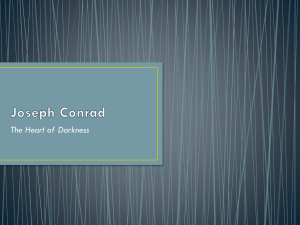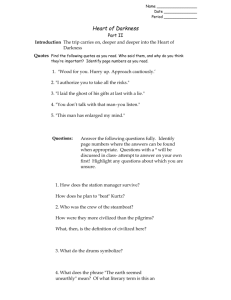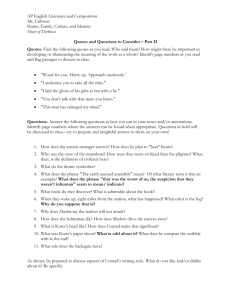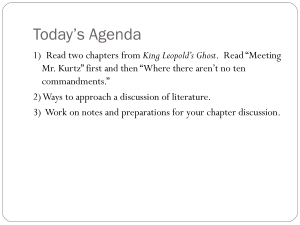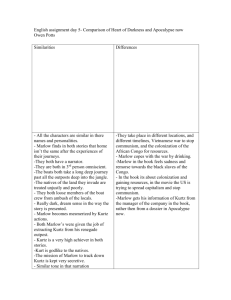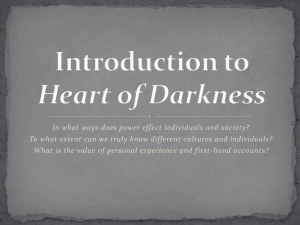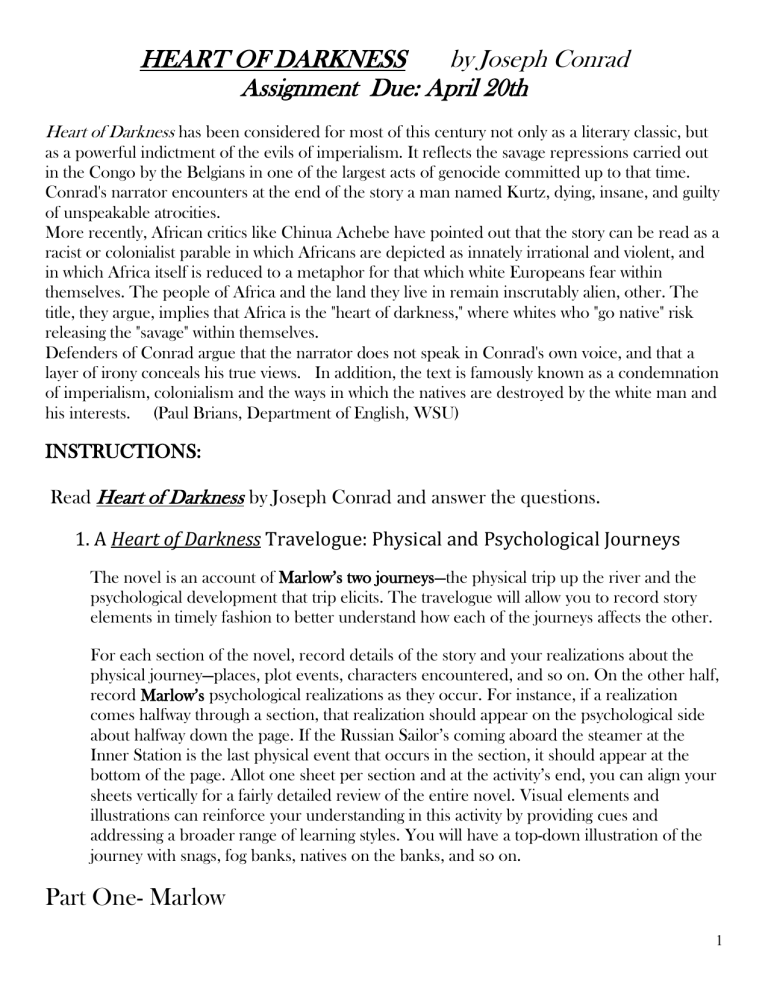
HEART OF DARKNESS by Joseph Conrad Assignment Due: April 20th Heart of Darkness has been considered for most of this century not only as a literary classic, but as a powerful indictment of the evils of imperialism. It reflects the savage repressions carried out in the Congo by the Belgians in one of the largest acts of genocide committed up to that time. Conrad's narrator encounters at the end of the story a man named Kurtz, dying, insane, and guilty of unspeakable atrocities. More recently, African critics like Chinua Achebe have pointed out that the story can be read as a racist or colonialist parable in which Africans are depicted as innately irrational and violent, and in which Africa itself is reduced to a metaphor for that which white Europeans fear within themselves. The people of Africa and the land they live in remain inscrutably alien, other. The title, they argue, implies that Africa is the "heart of darkness," where whites who "go native" risk releasing the "savage" within themselves. Defenders of Conrad argue that the narrator does not speak in Conrad's own voice, and that a layer of irony conceals his true views. In addition, the text is famously known as a condemnation of imperialism, colonialism and the ways in which the natives are destroyed by the white man and his interests. (Paul Brians, Department of English, WSU) INSTRUCTIONS: Read Heart of Darkness by Joseph Conrad and answer the questions. 1. A Heart of Darkness Travelogue: Physical and Psychological Journeys The novel is an account of Marlow’s two journeys—the physical trip up the river and the psychological development that trip elicits. The travelogue will allow you to record story elements in timely fashion to better understand how each of the journeys affects the other. For each section of the novel, record details of the story and your realizations about the physical journey—places, plot events, characters encountered, and so on. On the other half, record Marlow’s psychological realizations as they occur. For instance, if a realization comes halfway through a section, that realization should appear on the psychological side about halfway down the page. If the Russian Sailor’s coming aboard the steamer at the Inner Station is the last physical event that occurs in the section, it should appear at the bottom of the page. Allot one sheet per section and at the activity’s end, you can align your sheets vertically for a fairly detailed review of the entire novel. Visual elements and illustrations can reinforce your understanding in this activity by providing cues and addressing a broader range of learning styles. You will have a top-down illustration of the journey with snags, fog banks, natives on the banks, and so on. Part One- Marlow 1 Physical Trip up the River Psychological Realizations Text Thames River on a boat- thinking about how Romans colonized England, it was once undiscovered like what Marlow is doing with his explorations. Telling sea tales, always exaggerated Part Two- Marlow 2 Physical Trip up the River Psychological Realizations Part Three- Marlow 3 Physical Trip up the River Psychological Realizations Who is Kurtz? 4 Now that you have tracked Marlow’ journey, it is time to think about Kurtz. Who is he really? In the left-hand column, record quotations that illustrate character traits about Kurtz. Next to each entry in the right column, record the realizations that new information elicited. In some cases, new information may contradict earlier content; in others, the realization may be a reader response, such as “Kurtz seems to act without any concern for conventional morality.” In the case of Kurtz, you can also use the right-hand column to consider the source, for an enemy of Kurtz like the Brickmaker will speak poorly of him while a disciple like the Russian Sailor will sing his praises. In the bottom section, write a brief character sketch that synthesizes the information in the two columns. The synthesis might include inferences, predictions, personal responses or evaluations, or other ideas that move beyond the textual content. Find at least five from each of the three parts of the book. If you need to fill out more than sheet, you may do so. Quotations about Kurtz/pg. # Realization about his character…. Conclusions/Character Sketch of Kurtz: Part I Questions 1. Conrad structures Heart of Darkness as a frame story. For a writer, what benefits does this structure provide? 5 2. In the frame story section of the book, what details does Conrad include to create a sense of comfort and peacefulness? What elements contrast the serenity? 3. The unnamed narrator comments that Marlow is “not typical” of seamen. In what ways is he different? 4. As Marlow recounts his boyhood experiences, he says that he was like “a silly little bird.” What perceptions do you think this image might have for most readers? 5. Marlow notes that he “tried the women” in his attempts to become a steamer captain. In the novel, what is Marlow’s attitude towards this strategy? How do you react to his attitude? 6. As part of the employment process, Marlow visits an old doctor who works for the company. What measurements does the doctor take and why? How does this meeting affect Marlow? 7. How does Marlow’s aunt, “the excellent woman,” depict him to the wife of the high dignitary? What problems might this pose for Marlow? Why? 8. How does Marlow describe the African coast (beginning on p. 66)? 9. On occasion, “black fellows” in boats visit the ship that Marlow is aboard. Do you think that the description of these fellows is mostly positive or mostly negative? And, how do these descriptions compare to most depictions of whites in the novel? 6 10. When he reaches shore, Marlow encounters a chain gang of Africans. What impression does the encounter make on Marlow? 11. To allow the convicts to proceed up the trail, Marlow steps into a grove of trees. How does his impression of the Africans there compare to his attitude towards the convicts? 12. What impression does the Accountant make on Marlow? How does Marlow’s description of the Accountant contrast with descriptions of the Africans he has encountered? What effect does this contrast have on readers? 13. How does the Accountant maintain his appearance? What does the Accountant insinuate (or communicate without actually stating it)? 14. What is the Accountant’s attitude towards Kurtz? 15. How does the Accountant’s attitude towards the man who is dying in his hut affect readers’ impressions of him? 16. What feeling does the Station Manager inspire in Marlow? To Marlow, what seems to be the Station Manager’s best qualification for his job? 17. During his talk with the Brickmaker, Marlow realizes that the man is pumping him for information about Company politics. What aspects of characterization (details, images, diction) does Conrad use to make Marlow’s skepticism believable? 18. How does the Brickmaker characterize Kurtz? How does this characterization compare to what others have said about Kurtz? 7 19. On occasion, a night-roaming hippo comes ashore and the pilgrims empty their rifles into it to no effect. What do their actions convey about the pilgrims? What could the hippo symbolize? 20. Perhaps the closest companion Marlow makes at the Central Station is the foreman of the mechanics. Is the foreman a sympathetic character? Why? 21. What is Marlow’s reaction to the arrival of the Eldorado Exploring Expedition? How does Marlow react to the Station Manager’s Uncle? Part I Snapshots Marlow’s account of early explorers: In the text section starting with “Forthwith a change came over the waters” (p. 54) to “offer a sacrifice to....” (4-8), Marlow recalls great British explorers, their ships, and their exploits. He then characterizes the Romans, explorers who predated the British seamen, as men who faced the darkness and brought civilization to the savages. Finally, he talks of the predatory nature of explorers, men who “grabbed what they could get.” He reflects that the motives for exploration range from noble to shameful. From this section of the text identify and list content that they consider appropriate for one of these columns. Positive Exploration/Benefits Negative Exploration/Crimes Your Conclusions? 8 Reread the text section starting with “At last I got under the trees” (p. 24) to “I made haste towards the station” (p. 26). When Marlow stumbles into the shade of trees to allow the convicts to proceed farther up the trail, he unknowingly enters into what he calls “the gloomy circle of some Inferno,” a dark place where exhausted workers have crawled to die. Marlow provides detailed descriptions of the plight of these dying men; however, rarely does he use words that underscore their humanity. Why would the author would describe humans in such an impersonal way? Find some examples of the many ways Marlowe describes the men: Descriptions of the Men: Conclusions/Purpose of Author: Part II Questions 1. In the conversation between the Station Manager and the Station Manager’s Uncle, what details does Conrad include that create a sense of mystery about Kurtz? 2. What do the Station Manager and the Station Manager’s Uncle hope will happen to Kurtz? Why do they want to be rid of Kurtz? 3. Towards the end of their conversation, what affects Marlow so much that he leaps to his feet and startles the two speakers? 4. What causes one of the listeners on the Nellie to say, “Try to be civil...”? 5. According to Marlow, what for sailors is “the unpardonable sin”? How does this detail lend tension to the journey upriver? 9 6. In the paragraph that begins, “The earth seemed unearthly,” (p. 58), what elements does Conrad include to reinforce the sense of alienation Marlow feels? 7. Marlow provides a lengthy description of his fireman, a native that he trusts to perform his duties of firing and monitoring the steamer’s boiler. While he feels positively towards the man, does Mar- low’s description contain elements that are negative or patronizing? If so, what are some of the most significant ones? 8. What are some of the reasons Marlow calls the Russian Sailor’s hut “an extravagant mystery”? 9. Why does the Station Manager feel enmity towards the Russian Sailor? 10. Eight miles downstream from Kurtz’s camp, Marlow feels particularly anxious. What elements in the story contribute the most to his feeling this way? 11. How do the pilgrims react when they hear what Marlow calls a cry “of infinite desolation”? Given the circumstances, is the pilgrims’ reaction reasonable? 12. What reasons does Marlow give for the crew’s head man wanting to eat the Africans on the shore? 13. What does Marlow ironically call “the playful paw-strokes of the wilderness”? 14. As the steamer sits anchored in the fog, Marlow says that the idea of an attack is inconceivable to him because of the nature of the noise. The pilgrims fear an attack. In Section II, what are some other ways Conrad depicts Marlow’s differences from the other whites on the steamer? 10 15. Characterize Marlow’s description of his helmsman. What elements in the description best convey his skepticism? 16. In what ways do the helmsman and whites aboard jeopardize the steamer when it comes under attack from the shore? 17. After the attack, Marlow suspects that Kurtz might be dead. What about this loss creates a sense of extreme disappointment in Marlow? What will he now be unable to do? 18. During Marlow’s retelling of this section, one of the Nellie listeners criticizes the narrative as “absurd.” What major differences does Marlow cite to distinguish himself in the Congo from the listeners aboard the Nellie? 19. Marlow realizes that everything at the Inner Station belongs to Kurtz. Then, he wonders to what Kurtz might belong. Based on your understanding of Kurtz and Marlow’s story thus far, what do you think motivates Kurtz? To what beliefs does he subscribe? 20 To what does Marlow attribute the helmsman’s death? What did he lack? 21. As Marlow releases the corpse of his helmsman into the river’s current, he says that the helmsman was “heavier than any man on earth.” What elicits such a profound response for a man Marlow thought so little of in life? 22. What elements in the characterization of the Russian Sailor at the end of Section II make him seem out of place in such a foreboding setting? 11 Part II Snapshots Marlow’s account of navigation: One recurring element in the novel is Marlow’s account of the physical and psychological difficulties he encounters as he pilots the steamer up the great river. The text section, beginning “Going up that river was like traveling...” (p. 54) to “leaving hardly a sign—and no memories” (p. 58), gives some insight into the logistics of getting an unreliable steamer with an unqualified crew up a dangerous river. How does this section afford readers the opportunity to understand Marlow’s character more fully? Now, review this passage again, and identify and classify elements that help readers understand the ardors of the trip. Using a graphic organizer template like a bubble map or thematic web, classify into groups the types of elements that Conrad uses. Include types of images, groups of words, physical challenges, psychological burdens, and other elements. Now, think about how the disparate elements function as a whole to convey meaning. Gauge the elements’ effects on readers, their effectiveness, and the emotions they help create. Afterwards, Write brief paragraphs to demonstrate their understanding. 12 Just the Facts, Ma’am: The attack on the steamer, represents probably the greatest physical action in the novel, text section “I was looking down at the sounding-pole...” (p.73) to “...he said, glaring at the wounded man” (p. 76). As fans of crime dramas and similarly themed movies, many of us have a working understanding of how to recreate a scene based on evidence and eyewitness accounts. Using the passage as a basis, create elements that might be found in a crime scene report—an account with a principal witness (a fictionalized interview with Marlow), a timeline (summary of plot events), a schematic drawing that illustrates the steamer layout and location, interviews with bystanders/minor participants, and the like. Crime Scene Report: Witness Statement- Timeline of Events- Name: Marlow Statement- Significance Schematic- 13 Part III Questions 1. What useful information does the Rus- sian Sailor provide about Kurtz and the situation at the Inner Station? 2. Based on the Russian Sailor’s ramblings, characterize Kurtz’s methods of maintaining order and acquiring ivory. 3. In sections II and III, Marlow often recounts sights he viewed through bin- oculars. Does using this technique pro- vide Conrad with any benefits in telling Marlow’s story? How do the binoculars change Marlow’s perspective of the events on the shore? 4. Using your own words, describe as fully as you can the “rounded knobs” that Kurtz has mounted around his hut. Upon reviewing the section, do you think that your reaction to the sight was stron- ger than Marlow’s? Why or why not? 5. Marlow says that the heads only show Kurtz’s lack of restraint. Do you think this is true? At this point, do you think that Marlow is a reliable narrator? What biases might he have that readers probably do not? 6. Marlow refers to the “symbolic row of stakes” that circle Kurtz’s hut. What might the stakes symbolize? 7. When the whites bear Kurtz away from his hut on a stretcher, how is he dangerous even though illness has decimated his strength? 8. What apparently does Kurtz tell the natives to do as he is being carried to the steamer? Is this command consistent with your understanding of the man and his motivations? 14 9. When Kurtz encounters Marlow for the first time, he says, “I am glad.” What impression does Kurtz have of Marlow before he has even met him? What has he based this impression on? 10. What is Kurtz’s attitude towards the Station Manager? 11. Marlow says he is “Mr. Kurtz’s friend— in a way.” In what ways do you think Marlow is Mr. Kurtz’s friend? 12. When Kurtz escapes from the steamer, Marlow pursues him. In what ways does Marlow act differently when he is ashore? In what ways does he become like Kurtz? 13. Marlow says, “There was nothing either above or below [Kurtz]....He had kicked himself loose of the earth.” Using your understanding of the story, what do you think this represents? What is Kurtz free from or not subject to? 14. When the steamer leaves, Marlow describes the natives, especially the three men “plastered with bright red earth.” What elements of the description convey how little Marlow under- stands about the natives’ culture? 15. During their trip downriver, Marlow says that Kurtz’s was “an impenetrable darkness.” What do you think this darkness represents? 15 16. After Kurtz’s death, Marlow falls deathly ill. As he compares his near-death experience with Kurtz’s, Marlow recognizes a key difference—in his opinion, what makes him inferior to Kurtz? 17. What is Marlow’s attitude towards the Company representative who visits Marlow in Europe to gather Kurtz’s documents? Do you think Marlow’s attitude is justified? 18. A man calling himself Kurtz’s cousin visits Marlow and calls Kurtz “a universal genius.” Do you think the cousin has biases about Kurtz? Does Kurtz possess any elements of genius? 19. How does the journalist’s description of Kurtz succeed as a summary of Kurtz’s exploits in Africa? 20. What are the most significant and/or effective details Conrad uses to characterize Kurtz’s Intended? 21. Characterize the Intended’s beliefs about Kurtz. In the context of the novel, are these views accurate? What does she base her beliefs on? 22. Why doesn’t Marlow tell Kurtz’s Intended the truth about Kurtz’s last words? 23. After Marlow ends his tale, the frame story also concludes after only a brief paragraph. What effects does this structure have on readers? Do you think that the ending is effective? 16 Section III Snapshots The encounter with the tribal woman: The appearance of the “wild and gorgeous” native woman is atypical of the novel—most of the depictions of women in the novel portray them as weak or deluded. Here is a woman with power, what exactly that power is. Using the passage, “Dark human shapes could be made out” (p. 101) to “dusk of the thickets before she disappeared” (p. 102), identify and catalog the different techniques that Conrad uses to depict the impressive woman. Find examples of diction, imagery, her actions, and how others react to her. Diction Significance Imagery Significance Actions Significance Reactions of Others Significance Your Conclusions- Marlow’s Conversation with the intended: 17 As a focus for literary study, this passage, “You knew him well...” (125) to “The last words he pronounced was— your name” (129), provides a great example of dramatic irony, the literary technique where the audience possesses understanding that the characters do not. Here, the reader knows more about Kurtz than the Intended who bases her affection and beliefs on Kurtz as a suitor, a man very different from the voracious ivory hunter. To underscore this, the following activity may prove useful. Explicate the passage to see the two versions of Kurtz that Conrad presents—highlight Marlow’s ideas and statements in one color and the Intended’s ideas and statements in another. How do their views of Kurtz differ? ‘You knew him well,’ she murmured, after a moment of mourning silence. ‘Intimacy grows quickly out there,’ I said. ‘I knew him as well as it is possible for one man to know another.’ ‘And you admired him,’ she said. ‘It was impossible to know him and not to admire him. Was it?’ ‘He was a remarkable man,’ I said, unsteadily. Then be- fore the appealing fixity of her gaze, that seemed to watch for more words on my lips, I went on, ‘It was impossible not to—’ ‘Love him,’ she finished eagerly, silencing me into an ap- palled dumbness. ‘How true! How true! But when you think that no one knew him so well as I! I had all his noble confidence. I knew him best.’ ‘You knew him best,’ I repeated. And perhaps she did. But with every word spoken the room was growing darker, and only her forehead, smooth and white, remained illumined by the inextinguishable light of belief and love. ‘You were his friend,’ she went on. ‘His friend,’ she re- peated, a little louder. ‘You must have been, if he had given you this, and sent you to me. I feel I can speak to you—and oh! I must speak. I want you—you who have heard his last words— to know I have been worthy of him. ... It is not pride. ... Yes! I am proud to know I understood him better than anyone on earth— he told me so himself. And since his mother died I have had no one— no one—to—to—’ ‘I listened. The darkness deepened. I was not even sure whether he had given me the right bundle. I rather suspect he wanted me to take care of another batch of his papers which, after his death, I saw the manager examining under the lamp. And the girl talked, easing her pain in the certitude of my sympathy; she talked as thirsty men drink. I had heard that her engagement with Kurtz had been disapproved by her people. He wasn’t rich enough or something. And indeed I don’t know whether he had not been a pauper all his life. He had given me some reason to infer that it was his impatience of comparative poverty that drove him out there. ‘... Who was not his friend who had heard him speak once?’ she was saying. ‘He drew men towards him by what was best in them.’ She looked at me with intensity. ‘It is the gift of the great,’ she went on, and the sound of her low voice seemed to have the accompaniment of all the other sounds, full of mystery, desolation, and sorrow, I had ever heard— the ripple of the river, the soughing of the trees swayed by the wind, the murmurs of the crowds, the faint ring of in- comprehensible words cried from afar, the whisper of a voice speaking from beyond the threshold of an eternal darkness. ‘But you have heard him! You know!’ she cried. ‘Yes, I know,’ I said with something like despair in my heart, but bowing my head before the faith that was in her, before that great and saving illusion that shone with an un- earthly glow in the darkness, in the triumphant darkness from which I could not have defended her— from which I could not even defend myself. ‘What a loss to me—to us!’—she corrected herself with beautiful generosity; then added in a murmur, ‘To the world.’ By the last gleams of twilight I could see the glitter of her eyes, full of tears—of tears that would not fall. ‘I have been very happy—very fortunate—very proud,’ she went on. ‘Too fortunate. Too happy for a little while. And now I am unhappy for—for life.’ ‘She stood up; her fair hair seemed to catch all the remaining light in a glimmer of gold. I rose, too. ‘And of all this,’ she went on mournfully, ‘of all his promise, and of all his greatness, of his generous mind, of his noble heart, nothing remains—nothing but a memory. You and I—’ ‘We shall always remember him,’ I said hastily. ‘No!’ she cried. ‘It is impossible that all this should be lost— that such a life should be sacrificed to leave nothing—but sorrow. You know what vast plans he had. I knew of them, too—I could not perhaps understand—but others knew of them. Something must remain. His words, at least, have not died.’ ‘His words will remain,’ I said. ‘And his example,’ she whispered to herself. ‘Men looked up to him— his goodness shone in every act. His example—’ ‘True,’ I said; ‘his example, too. Yes, his example. I forgot that.’ ‘But I do not. I cannot—I cannot believe—not yet. I can- not believe that I shall never see him again, that nobody will see him again, never, never, never.’ ‘She put out her arms as if after a retreating figure, stretching them back and with clasped pale hands across the fading and narrow sheen of the window. Never see him! I saw him clearly enough then. I shall see this eloquent phantom as long as I 18 live, and I shall see her, too, a tragic and familiar Shade, resembling in this gesture another one, tragic also, and bedecked with powerless charms, stretching bare brown arms over the glitter of the infernal stream, the stream of darkness. She said suddenly very low, ‘He died as he lived.’ ‘His end,’ said I, with dull anger stirring in me, ‘was in every way worthy of his life.’ ‘And I was not with him,’ she murmured. My anger subsided before a feeling of infinite pity. ‘Everything that could be done—’ I mumbled. ‘Ah, but I believed in him more than any one on earth— more than his own mother, more than—himself. He needed me! Me! I would have treasured every sigh, every word, every sign, every glance.’ ‘I felt like a chill grip on my chest. ‘Don’t,’ I said, in a muffled voice. ‘Forgive me. I—I have mourned so long in silence—in silence.... You were with him—to the last? I think of his loneliness. Nobody near to understand him as I would have understood. Perhaps no one to hear. ...’ ‘To the very end,’ I said, shakily. ‘I heard his very last words....’ I stopped in a fright. ‘Repeat them,’ she murmured in a heart-broken tone. ‘I want—I want—something—something—to—to live with.’ ‘I was on the point of crying at her, ‘Don’t you hear them?’ The dusk was repeating them in a persistent whisper all around us, in a whisper that seemed to swell menacingly like the first whisper of a rising wind. ‘The horror! The horror!’ ‘His last word—to live with,’ she insisted. ‘Don’t you understand I loved him—I loved him—I loved him!’ ‘I pulled myself together and spoke slowly. ‘The last word he pronounced was—your name.’ How would you characterize the different views of Kurtz? Heart of Darkness Literary Analysis Due April 24th 19 Choose one of the following topics and write a well-developed essay that conveys the effectiveness of how the theme was portrayed. Make sure to also identify literary devices used by the author and how the devices were used to convey the theme. Imperialism One of the major themes of Heart of Darkness is imperialism. Imperialism is actually European colonization of countries from Asian and African continents for resources. However, it was hidden in the slogan of spreading civilization. Marlow accepts taking African’s land from the people is not right. Kurtz is in Congo pretending to civilize the people and was engaged in the ivory trade and involved in horrific ancient rituals of sacrificing humans to appease the native Africans. Marlow describes the ravages of imperialism during his journey to the heart of Africa. White Man’s Burden Another prominent theme of the novel is irony of Marlow’s voyage and the purpose. He journeys toward Congo to meet popular station manager, Kurtz. Though Kipling’s words “white man’s burden” wring in his ears, he sees the opposite. The white man, including Mr. Kurtz, has been engaged in killing the natives to plunder the resources. There are heads erected on the poles around the station where Mr. Kurtz is staying. Marlow believes that his voyage is “heavenly mission” of a white man to spread the enlightenment of Christianity in the darkness. Lack of Truth The superficial themes of the novel are imperialism and cruelty of the European powers. However, the theme of the lack of truth lies at the heart of the text. All the European powers engaged in Africa are occupying their land and plundering resources while propagating it as a civilizing mission. Marlow says that several things are left out and, in his words, “away from the truth of things.” The ironic language used from the very start occasionally shows that Marlow cannot speak the truth. He finally tells another lie to avoid disappointing Kurtz’s Intended that Kurtz had said her name before dying. Colonization Colonization means establishing control over the indigenous people of a country or a place. This theme also runs parallel to diverse other themes in Heart of Darkness. In one of the situations, Marlow, the spokesman of Conrad, clearly states that conquest of the earth means “taking it away from those who have a different complexion.” In other words, he is indicating that the Europeans think they are of a higher race. They destroy their land by the colonization and eventually steal Africa’s resources. Exploitation The ivory trade is the main trade throughout the Congo River. However, Marlow does not clarify or accept the amount of brutal exploitation that happened in the name of trade. It is only mentioned in oblique words such as “the horror” and the postscript of Kurtz “Exterminate all brutes,” which points out the truth about the trade and the people involved. In fact, Marlow is also the part of this exploitation where locals are misled and mesmerized by Kurtz. They are also enticed to attack the people not standing in line with the main agent, Kurtz, including the attack on the steamer carrying Marlow. These attacks also cause death to locals more than the targets. The exploitation continued even after Kurtz’ death. Racial Discrimination The novel Heart of Darkness shows that racial discrimination was dominating in Africa and other parts of the world. Marlow also understands that “different complexions and flattened nose” means, Europeans were permitted to take the possession of the land from that race. Marlow too called the locals savages including the Intended of Kurtz. She tells him how racial discrimination has led to the white men’s action of making ideas of 20 civilizing those savages. The words of Kipling that it is “white man’s burden” echoes in the end when Kurtz dies, speaking of the horror that he committed against the African people. Alienation and Isolation Although alienation and isolation are often understood as a psychological issue of an individual, the novel Heart of Darkness has presented alienation and isolation of both; psychological as well as social. Marlow’s departure hints to social alienation and isolation which tries to rob him of his humanity. Kurtz is the prime example of this alienation in that he mixes up with the locals and tries to become one of them. His alienation completes with his final outburst of “horrors” when he comes to know the results of his actions. Marlow’s initial Buddha-like posture, too, confirms this alienation and isolation. Moral Corruption Moral corruption is another underlying theme of the novel, Heart of Darkness. Kurtz goes to Congo to civilize the locals. However, he becomes a top agent of the company in robbing the locals of their treasure and exporting ivory. He is engaged in corrupt practices of punishing those who oppose him and becoming their demigod. The same goes on at the other stations where Marlow sees many small agents engaged in the same practices. Violence There are two types of violence; the first one is provoked cruelty. For instance, Kurtz incites the natives to attack the steam carrying Marlow. The second one is the violence among the natives and the heads on the sticks around Kurtz house. Here Kurtz who claims to change the savages has become a savage. He uses violence to dominate the natives to rob and punish them if they interfere in white men’s business. Human Greed and Deception Marlow says that he has seen “the devil of greed, and the devil of hot desire” which refers to the ivory trade at the expense of the native Africans’ freedom and life. The European companies have been competing against each other to extract treasures as soon as possible. Using violence, they go on killing spree and massacring the innocents. The pieces of evidence of this human greed and deception can be seen clearly when Kurtz displays heads on the poles around his station. Please upload your paper to Turnitin.com. 21
